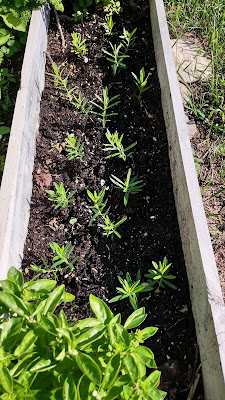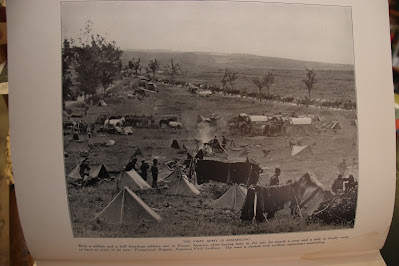A week ago our great-grandsons from Kalamazoo were here with their parents, and this past weekend it was my sisters’ turn to visit from their homes in Illinois. Orchard crews are at last harvesting cherries around my old farmhouse (tarts are ready later than sweets), and though I think every morning that the black raspberry patches must be almost exhausted, that fruit just keeps coming on, with blackberries ripening farther afield. Meanwhile, in the garden, squashes are taking shape, and tomato plants (started from seed) are finally flowering. I’m still waiting on cucumbers but pulled out spent cilantro and transplanted butterflyweed seedlings in the space created. They look good so far.
It is summer. High season.
Sunny Juliet and I got to Lake Michigan again, beating the crowds by going shortly after sunrise. Neither of us has gone swimming yet, though. I’m letting her get used to the Big Lake at her own pace, wading into and out of the gentle waves without urging her one way or the other. Summer here Up North is time for work and play and company. Twin great-grandsons and their parents, sisters, stepdaughters, friends. Some have been here, others yet to come. Sharing places I love is an important part of my life.
Sharing books I love is important, too, and my latest happy discovery – for which all credit goes to the friend who sent me the book! – is Molly Gloss’s The Hearts of Horses, which is hands-down the horsiest novel I have ever read. I was disappointed when The Horse Whisperer turned out to be more love story than horse story; there is a love story in the Gloss novel, too, but horses predominate. – Which doesn’t mean there is any dearth of human interest!
I’ve always wondered at the lack of readership for World War I history. The “Great War,” it was called back when people thought such a global conflict surely could not possibly happen a second time around. (The period between the wars fascinates me, too.) Well, lately WWI seems to be following me so closely it’s treading on my heels. Sarah Shoemaker’s Children of the Catastrophe takes place in the years 1908-1922 (Sarah was last week's speaker in the library Summer Author Series here in Northport); T. C. Corbett’s The Drums of War draws on his diaries from World War I; and The Hearts of Horses takes place in that period, also. Although far from the fighting, some of the farmers and ranchers in Gloss’s novel are swept up in a jingoism that puts their German immigrant neighbors in peril. There is also discussion between the characters of the fates of the thousands of horses shipped over to Europe to become cannon fodder or shell-shocked survivors right along with the soldiers.
The main story of The Hearts of Horses, however, takes place out West. It is no longer open, fenceless rangeland, but big-boned teenager Martha Lessen is determined to lead as free a cowboy life as she can and rides away from home to offer her services “breaking” horses. Martha does not have much in the way of social graces, but, perhaps because she was so sensitive to the feelings of horses, she wasn’t bad at picking up cues about people’s feelings without having to have everything spelled out for her.
…By the time she took work breaking horses for George Bliss, her method was to come into the corral with a little buggy whip and brandish it – she almost never had to touch the horse…. At the same time, Martha always acted as if there was nothing to get excited about, figuring the horse would eventually get the same idea; so she’d begin singing to him quietly….
And from a different moment in the story:
It wasn’t clear to Martha how she could be any help to the Kandals, either of them, but she didn’t feel it would be right to leave. She stood a moment trying to think what else she could offer to do [she had fed the chickens and stirred up the kitchen fire already], and when her mind failed her she said, “I’ll just sit down with you, if that’s all right, until the doctor gets here.”
A simple story in many ways, The Hearts of Horses goes along in its steady way, documenting, if you will, the lives of fictional people in an isolated community until they are as real to us as our own neighbors. I am eager to read more of Molly Gloss, though I have to admit I hope there will be horses in her other books, too.
Long, SURPRISING (to me) Postscript:
As I was in the midst of drafting this post, a woman brought in a box of old books she wanted to sell, and one of them was the second volume of a two-volume set showing "the World War," i.e., the one we call World War I or the First World War, in photographs. What are the odds? That war again!
The captions to the photographs are heartbreaking. The soldier sitting in a bombed-out wall opening (second of four above) is writing home from the battlefield:
‘JUST BEFORE THE BATTLE MOTHER”
“Somewhere in France,” begins the letter which Clarence E. Ford, Company C, 308th Field Signal Battalion, 83rd Div., is writing home, Sept. 1, 1918. “Somewhere in France” was a shell hole in a garden wall at Chateau-Thierry.
Following that photograph is one of the First American Army assembling, and below it a detail showing the horses. The caption to a photograph of captured German prisoners (not shown here) has a headline reading: “HATE IS A MANUFACTURED INGREDIENT ON BOTH SIDES.”
I do not focus on the horses for lack of concern for the men. In fact, more than one photograph of a destroyed village notes that the laughter of children is no longer heard there. But since it was a conversation about horses that brought the war home to Molly Gloss’s characters and her readers, I noted particularly any of the war photos showing horses. The last one here is entitled “GASSED HORSES” and reads as follows:
With their ribs sticking out as in death and white mucous [sic] coming out of their blind eyes, these gassed horses are being brought back for inspection. For many of the suffering beasts inspection will seal their death warrant.
No, I do have a more cheerful closing today: Tonight’s guest, the fourth and last in the Summer Author Series (sponsored by the Friends of the Leelanau Township Library), will be Soon-young Yoon, whose book is entitled Citizen of the World: Soon-Young and the UN. I highly recommend her book. It contains short, readable essays on various projects with which she was involved around the world, and it is full of hopeful stories of people making differences in all manner of good ways. That's 7 p.m. at the Willowbrook Inn on Mill Street in Northport.
















2 comments:
What a variety of ideas you bring us! My favorites are your thoughts and pictures on summer. Seems like we just suck it in while it's here.
Savor it!!!
Post a Comment